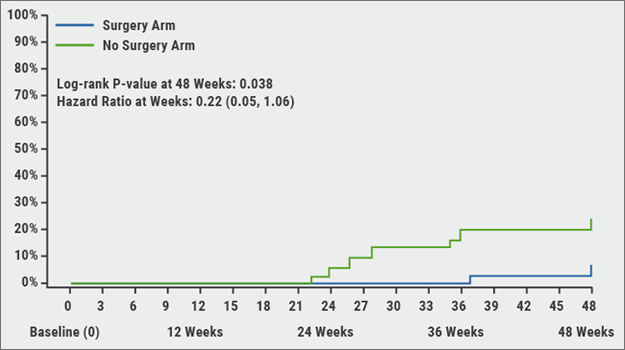Previous studies have found no protective effect of CPAP on adverse cardiovascular outcomes in patients with coronary artery disease and non-sleepy obstructive sleep apnoea (OSA) [1-3]. “Our previous study showed that those with non-sleepy OSA who demonstrated a greater respiratory event-related pulse rate response (ΔHR) are at increased risk of cardiovascular morbidity and mortality,” Prof. Ali Azarbarzin (Harvard Medical School, MA, USA) explained [4]. This was the rationale to test the hypothesis that patients with a higher pre-treatment ΔHR might benefit more from CPAP regarding cardiovascular outcomes. Therefore, Prof. Azarbarzin and his colleagues re-analysed data from the RICCADSA clinical trial (NCT00519597) of cardiovascular risk for non-sleepy OSA patients with heart disease [5]. ∆HR was measured from the oximetry pulse rate signals collected during baseline polysomnography of the RICCADSA trial. The primary outcome of this analysis was a composite of repeat revascularisation, myocardial infarction, stroke, and cardiovascular mortality. In the original study, the OSA effect on cardiovascular disease was similar across subgroups. The researchers now analysed whether the effect of the CPAP treatment on the primary outcome was influenced by ∆HR. “If this were true, then we would expect to see a preferential benefit from using CPAP on cardiac outcomes in those with higher ∆HR,” said Prof. Azarbarzin. “Indeed, this is what we found: the greater the ∆HR, the greater the calculated treatment benefit of CPAP.”
∆HR measures were obtained in 92% of patients, and 48 composite events were recorded over a 57-month median follow-up. A significant interaction between treatment and ∆HR was observed. CPAP provided protection from cardiac events in non-sleepy OSA patients whose pulse rates rose significantly during sleep apnoea events. Patients with the highest ∆HR of 10 beats per minute experienced a >50% reduction of risk for a cardiovascular event when treated with CPAP (see Figure).
Figure: Patients with high ∆HR experience a more than 50% risk reduction for cardiovascular events with CPAP [5]

OSA, obstructive sleep apnoea; CVD, cardiovascular disease; ∆HR, pulse rate response.
“Our study provides novel evidence that a greater heart rate responsiveness to obstructive airway events is an identifiable, deleterious, and potentially reversible risk factor that could be used to select patients most likely to exhibit long-term cardiovascular benefit from CPAP therapy,” Prof. Azarbarzin concluded.
- McEvoy RD, et al. New Engl J Med 2016;375:919-31.
- Peker Y, et al. Am J Respir Crit Care Med 2016;194(5):613-20.
- Sánchez-de-la-Torre M, et al. Lancet Respir Med 2013:1(1): 61-72.
- Azarbarzin A, et al. Am J Respir Crit Care Med 2021 Jan 6 [e-pub ahead of print].
- Azarbarzin A, et al. Cardiovascular benefit of CPAP is modified by the Sleep Apnea related pulse rate response in coronary artery disease patients with nonsleepy OSA: Findings from the RICCADSA randomized controlled trial. Session B14: Pathophysiology, cardiovascular disease, and COVID – what´s happening in sleep research right now. ATS 2021 International conference, 14-19 May 2021.
Copyright ©2021 Medicom Medical Publishers
Posted on
Previous Article
« Association between positive airway pressure treatment adherence and COVID-19 infection rates Next Article
OSA: A risk factor for earlier cognitive decline »
« Association between positive airway pressure treatment adherence and COVID-19 infection rates Next Article
OSA: A risk factor for earlier cognitive decline »
Table of Contents: ATS 2021
Featured articles
Letter from the Editor
COVID-19: What Pulmonologists Need to Know
Antibody treatment for COVID-19: a combination is successful
Air pollution: an underestimated negative prognostic factor for COVID-19
Healthcare workers vulnerable to SARS-CoV-2 infections
Genetic risk variants responsible for COVID-19 predisposition
Asthma – An Update
“As-needed” inhaled corticosteroid therapy for mild asthma – what is the evidence?
IL-4/13 blocker successful in treatment of paediatric moderate-to-severe asthma
Benralizumab lives up to its phase 3 results in real-world findings
Tezepelumab – good success rates in various types of severe asthma
Sleep Disorders – An Underestimated Problem
OSA: A risk factor for earlier cognitive decline
Subgroup of patients with high heart rate response and coronary artery disease benefit from CPAP
Association between positive airway pressure treatment adherence and COVID-19 infection rates
COPD – What Is New
Possible aetiologies for COPD exacerbations – more evidence is needed
Does COPD plus COVID-19 equal higher mortality?
Biomarkers for acute exacerbations in COPD are required
Severe exacerbations: A key driver of all-cause mortality in COPD patients
Men and women with COPD differ in many ways
Younger adults with COPD at higher health risk than previously thought
Metabolic Dysregulation and Lung Disease
Obesity: A risk factor for new-onset asthma and worse asthma control
Metabolic dysfunction and lung disease: children are no small adults
Best of the Posters
Air pollution in winter linked to more hospital admissions in ILD patients
Tobacco biomarkers do not improve prediction of lung cancer risk
Vaping identified as risk factor for asthma
Related Articles
July 18, 2022
Novel PDE4B inhibitor offers breakthrough for IPF
July 18, 2022
New guidelines for IPF and PPF

November 7, 2018
Gastroesophageal reflux, IPF and lessons learned
© 2024 Medicom Medical Publishers. All rights reserved. Terms and Conditions | Privacy Policy
HEAD OFFICE
Laarderhoogtweg 25
1101 EB Amsterdam
The Netherlands
T: +31 85 4012 560
E: publishers@medicom-publishers.com

